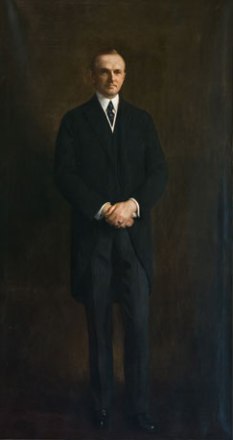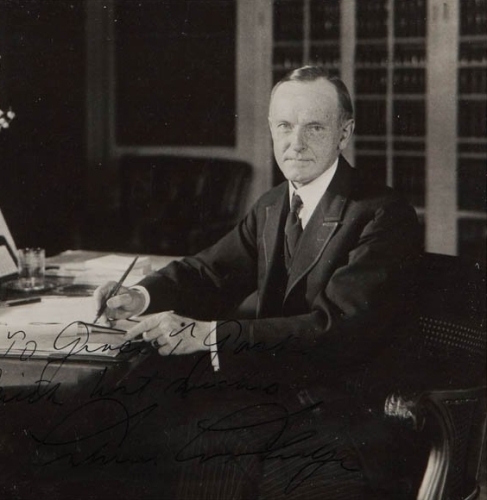In early 1919, Governor Coolidge received a bill in which the State Legislature had voted to raise their own salaries by fifty percent. It was fully expected that the Governor would sign the bill and everyone would let it quietly slip by the people of Massachusetts. They underestimated with whom they were dealing. Coolidge launched a fiery veto of the measure, in which he shot back, “Those in whom is placed the solemn duty of caring for others ought to think of themselves last or their decisions will lack authority. There is apparent a disposition to deny the disinterestedness and impartiality of government. Such charges are the result of ignorance and an evil desire to destroy our institutions for personal profit. It is of infinite importance to demonstrate that legislation is used not for the benefit of the legislator, but of the public.”
Coolidge had no sympathy for those who take their public trust as an opportunity to aggrandize, profit or otherwise serve themselves with the laws they pass. Legislators had to be brought back to this reality. They were, and will remain, under the rules they write for everyone else.
The people, to whom the costs fall, ultimately see to it that politicians do not successfully legislate their own escape clauses. Through years in the State House, Coolidge saw the need to resist this dangerous trend of legislators, who carve out special provisions or exceptions in their own bills. From that experience he urged his father as the elder Coolidge prepared to serve in the Vermont Senate, “It is much more important to kill bad bills than to pass good ones.” Coolidge recognized, with equal fidelity to his oath as President, his responsibility to check this impulse in Washington. Speaking to labor leaders from the White House, he declared, “The Government of the United States is not for the gratification of the people who happen to hold office. It is established to promote the general welfare of all the people. That is the American ideal. No matter how many officeholders there may be, or what their origin, our institutions are a failure unless they serve all the citizens in their own homes. It is always necessary to find out what effect the institutions of Government and society have on the wage earner, in order to judge the disability of their continuance.”
When Ronald Reagan spoke out in October 1964, ten months after President Johnson announced his “War on Poverty” which would form the basis of the Great Society later that same year, he observed an all too rare occurrence in government social experiments: They never read us the score. We never hear how each new effort to eradicate the evils of society with legislation makes conditions worse every time. Government programs and the appropriations claimed necessary to fund them are sold on the lofty promises of good intentions mixed with the fear of chaos if Washington is not given room to act. What is never included in the rush to legislate is the honest discussion of the problem, the truthful calculation of cost, the price not only in tax dollars but also in human lives. The cost is never so high at the initial estimates as it is in the end. Moreover, the end never comes. The program never achieves its purpose and the problem never resolves. The costs only increase, monetarily and spiritually.
Those with the audacity to ask whether “Program X” or “Act Y” is working are rebuked as unfeeling and devoid of compassion. The good intentions of the what LBJ touted as “the best thought and broadest knowledge” are supposed to silence all questions, trusting that Washington, with its purest intentions, has it in hand and with just a little more time we can wipe poverty away, cure all inequities, and make a happy, healthy and content people.
Coolidge saw all this for the fraud it is, saying, “There can be no perfect control of personal conduct by national legislation.” He knew the outcome of naively expecting more than mere legislation can ever produce, when he said, “Laws are insufficient to endow a nation with righteousness” or again, when he observed, “Real reform does not begin with a law, it ends with a law. The attempt to dragoon the body when the need is to convince the soul will end only in revolt.” Even legislation passed which is “changed and changeable on slight provocation, loses its sanctity and authority.” Too many pieces of legislation over these last five years had little sanctity or authority at their beginnings to the shame of those who helped pass them.
When “train wrecks,” like Obamacare (set to go into effect on Tuesday), find a President arbitrarily waiving parts of the law to exempt the lawmakers, it is time for the people to again exercise their sovereign authority. When that same President and a timid and willing Senate then keeps other provisions in place on the backs of the rest of us, it is time for reality, through the voice of the people, to return to Washington. It is time for Americans to reassert the standards of our foundation. Coolidge identified it this way, “Our country has maintained the principle that our Government is established for something higher and finer than to permit those who are charged with the responsibility of office, or any class whose favor they might seek, to get what they can get out of it.”
We have gone too long without hearing the score. In reality, Washington is winning while liberty is losing. It did not get here quickly and it will take decades to get back. But this is what gives us all the more urgency to act now. We are no longer looking at these problems as Coolidge saw them: approaching from afar. They are already in our midst. Doing the right, while never easy, is historically the simplest and most obvious course. It is the choice between a very real evil and the genuinely fulfilling good. Either we are a republic of laws over human whims, holding the light of constitutional self-government aloft in this world, or we are ready to recede back into the ancient darkness of despotic kings, permanent immobility, and hereditary classes dispensing freedom or oppression to us as they see fit. It is the impasse plotted by Coolidge when he said, “The choice lies between living under coercion and intimidation, the forces of evil, or under the laws of the people, orderly, speaking their settled convictions, the revelation of a divine authority.”

